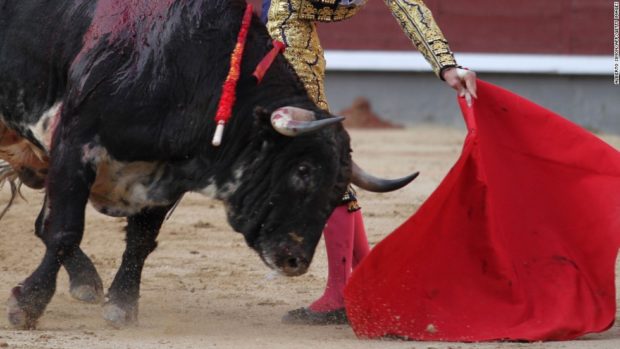SPAIN (CNN). – Bullfighting is an indelible part of Spanish culture, a ritual that forms part of the nation’s cultural patrimony, immortalized in countless works of art, according to its supporters,
Professional bullfights and bull running events remain popular in Spain, especially in the summertime. However, the ritual has become increasingly politicized and with new current developments in the southern region of Andalucia bullfighting’s has a new-found importance as a political symbol.
In December 2018, “VOX”, a far-right party known for its hard stance on illegal immigration, won 12 seats in a regional election for the first time since the death of dictator Francisco Franco in 1975. Vox used its position to join a center-right coalition after making a deal with the Partido Popular (PP).
In return for its support, VOX negotiated a number of conditions with the PP, including commitments to lower taxes, combat illegal immigration, tackle Islamic fundamentalism and “support for our traditions” specifically referring to bullfighting. At the same time, on the other side of the political divide, certain sectors of the Spanish left have been working in conjunction with animal rights campaigners to have the tradition banned.
During the Spanish Civil War (1936-39), both right-wingers and left-wingers organized bullfights as a way of raising funds, said Badorrey Martín, who emphasized that her academic research focuses on the earlier history of the sport.

Bullfight in Plaza Las Ventas, in Madrid, is the largest bullring in Spain, with room for 23,798 spectators and 18,000 season tickets sold annually.
However, for the “Fundación Toro de Lidia” an NGO that promotes bullfighting in Spain, taking a strong position against bullfighting is just part of a political strategy for the extreme left that has grown in strength in the last few years.
The defense of bullfighting might have become a newly important political debate in recent times, but anti-bullfighting campaigners have previously won some important victories such as Catalonia in 2013, that became the second autonomous region in Spain to ban the fights, two decades after the Canary Islands. However, both areas of Spain have never been known to be strong followers of bullfights unlike other places such as Madrid.
Some say bullfighting is seen with increasing apprehension by a growing number of people, who previously were indifferent to the cultural expression of the bulls. Though, there is still a large amount of the population, young and old who grasp to this tradition.
While Spain is not scheduled to hold a general election until 2020, there will be a number of regional and local elections this year. Polls show that the far-right could repeat its success in Andalucia and pick up seats in other areas of the country, according to Reuters. This means a long road ahead to those against bullfighting in Spain.
SMT Newsroom

